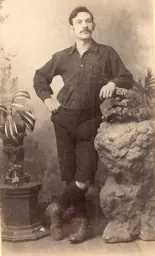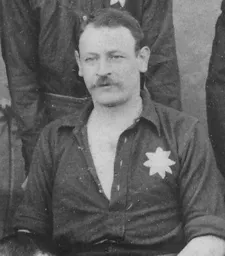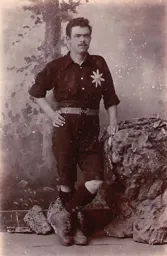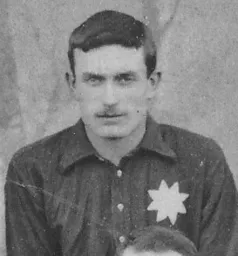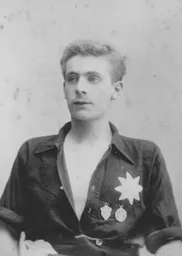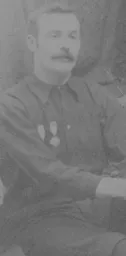The Luton Reporter -
“Luton Town qualify for the Second Round.
Saturday last was a great day with the players of Association football throughout the length and breadth of the country, for them a vast number of teams met in 10 divisions to decide which should enter the second round of the qualifying competition for the English Cup. Luton Town, who were included in the 9th division, were somewhat fortunate in being drawn against a team of considerably lesser strength than several others included in the same list. Their opponents, Old St. Mark’s, were a team of no mean order of merit, but all the same one which Luton had beaten repeatedly. The encounter had created a great deal of interest in local football circles, and although prevalent opinion seemed to be that the homesters would emerge from the fray with flying colours, they were less hopeful spirits who anticipated they would at least find the task set them a very difficult one. That the interest was exceedingly great was shown by the fact that in spite of a somewhat high charge for admission, considerably upwards of 1,000 spectators lined the ropes which enclosed the field of battle. The contest had been announced to commence at 3.30, and shortly after that hour the teams ranged up round the central ring in the following order:- Old St. Mark’s: Goal, J.W. Payne; backs, F.J. Leese and G.C. Jarvis; half-backs, A.W. Vautier, W.H. Silver and J. Thornley; forwards, J.R. Schumacher and J.M. Baxter (right), J.F. Wood, captain (centre), C. Cattell and W.D. Redmond (left). Luton Town: Goal, J. Burley; backs, A. Sanders and A. Hoy; half-backs, J.W. Julian (captain), A.H. Taylor and J. Wright; forwards, W. Chesher and R. Brown (right), F. Allen (centre), H. Whitby and F.K. Whitby (left). The referee was Mr R.E.A. Maynard (Reading), and the linesmen Messrs H. Shane (Luton) and A.R. Clark (Old St. Mark’s). It will be noticed that the Old St. Mark’s team was almost identical to its composition with that which was opposed to Luton Town last season, and the home side differed only in three players from its Cup eleven of last year.
Julian won the toss, but this afforded very little advantage to his side, there being no wind to speak of and an utter absence of bright sunshine. Directly after Wood had kicked off the home forwards acquired possession of the ball and brought it down towards the gas work’s goal in very fine style, but they ended in failing to score. The Old Collegians retaliated, but they found in Julian a very stout foeman and he effectively prevented their making any further inroad into his side’s territory. Allen, with his fellow forwards repeated their tactics but Leese relieved. The Luton forwards again, distinguished themselves shortly afterwards, and this time their failure to score was only by a foot or two, the goalkeeper missing his kick. Payne, however, amply atoned for this failure immediately afterwards by saving in particularly fine style. A free kick against Luton for an infraction of the regulations was directly afterwards followed by a similar advantage being awarded to them. The St. Mark’s forwards whose passing had been admired extremely, made a determined onslaught and got into close proximity of the home goal, when Sanders, reliable as ever, came to the rescue and kicked the ball away in magnificent style. A corner to St. Mark’s was the next point of interest, but the ball was sent over the cross-bar. Chesher, with a very long range shot, narrowly missed scoring, the ball going over instead of through. Both teams were making very determined efforts to score and the result was that the play became very fast and exciting. It must be confessed, however, that the “reds” were having somewhat the best of matters. The visitors then came within an ace of scoring shortly afterwards, but Hoy deprived their forwards t the delight of the onlookers. Taylor, F. Whitby and Allen next rendered themselves noticeable, the last named being generally considered to be an efficient centre forward. Taylor was fouled somewhat badly, and a free kick was awarded to his fellows. The Lutonians kept up the bombardment of their opponent’s citadel for some moments, but a free kick to St. Mark’s relieved the pressure somewhat, and the leather was thereafter transferred to the other end. The breaking of the offside rule stopped further progress of the Saints, and when the home side had paid a visit to the latter’s goal, Taylor put in a very fine shot which was only saved at the expense of a corner. The homesters experienced exceedingly hard luck several times within the next few minutes, and they were unable to score in spite of obtaining several advantages. Leese hereabouts seemed to be under the impression that he was playing under the Rugby rules, for he “collared” Allen, an action which was promptly visited with its usual penalty by the referee. Schumacher was playing in very fine style about this time. Julian put in a hot shot next, but on F. Whitby rushing up to put on a finishing touch he was adjudged off-side. Payne was forced to give another corner after a plucky attempt by Brown to score. The young player named repeated his effort just afterwards, the result being precisely similar. The Town representatives continued to have very much the best of the game, and at length from a grand pass by Allen, H. Whitby succeeded in getting the ball into the net. Thus the first point was obtained by Luton, and achievement which was hailed by the spectators with enthusiastic shouts. The applause had scarcely died away when from a corner Brown notched another point, making the score two to nil in favour of the “reds.” A highly regrettable incident had to be chronicled a minute or two later. The referee had awarded a free kick against the visitors on the score of a foul by Leese. That player promptly challenged Mr Maynard’s decision and flatly denounced the referee’s explanation as a “lie.” He was immediately ordered to retire from the field. This event proved an incalculable disadvantage to the St. Mark’s side, for during the remainder of the game they played with 10 men only, and considering that Leese was one of their backs, it will at once be recognised that their defence was greatly weakened. When the interval arrived the “reds” were leading, the score being: Luton, two; Old St. Mark’s, nil.
Directly after the restart, Chesher sent in a beauty, but the effort was rendered nugatory by Payne. Luton forced a corner and Brown struck the post. The absence of Leese made the Luton forwards liable to having the verdict of off-side given against them, and several times when the goal seemed at their mercy they were in this respect unfortunate. Despite this the homesters had all the best of the play for an appreciable space, and only once during the early portion of the second period did the Old Collegians succeed in carrying the ball into the neighbourhood of their enemies’ fortress. Their style was by no means to be despised, for their efforts to open their account were extremely plucky. Burley, having been troubled once or twice by the visitor’s right, replied with a splendid attempt, Payne only just managed to dispose of it. F. Whitby fiercely attacked Payne’s charge, but his endeavours were fruitless, the keeper disposing of the sphere at the expense of a corner. From a splendid pass right across the mouth of the goal, F. Whitby succeeded in putting the leather through, and then the score stood at three to nothing in favour of the leaders. Chesher who had been playing in particularly gratifying style, next kicked just outside the posts; his example was followed by Allen. After several corners had fallen to the Town’s men, the Londoners took a long run and finished up with a shot from the right wing which struck the net, a performance repeated immediately afterwards. Twice in rapid succession the visitors’ goalkeeper was called upon to defend, and he acquitted himself extremely well. “Hands” for Luton was followed by a corner, and the ball being extremely well placed, Julian headed through. From the start to the finish both teams exerted themselves strenuously, but neither succeeded in adding to the total, and when the referee’s whistle announced the arrival of time the Lutonians had qualified for the second round by four goals to nil. Every credit is due to the home representatives for the excellent display they made, their style being a welcome contrast to that witnessed the previous week. The back division was as sturdy and reliable as ever, and the forwards show a great improvement, the introduction of Chesher proving a very wise step. Good style was shown by the losers, several of their players being worthy of high commendation. The decisions of the referee did not always appear to give unbounded satisfaction to the spectators, but all that need be said of Mr Maynard is that he demeaned himself, as on former occasions, with the strictest impartiality.”


